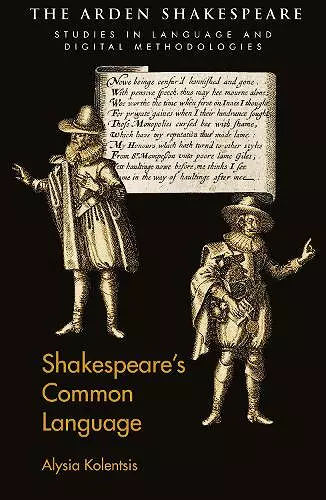Shakespeare’s Common Language
Format:Paperback
Publisher:Bloomsbury Publishing PLC
Published:17th Jun '21
Should be back in stock very soon

Uses language theory to highlight the foundations of Shakespeare’s language, focusing on easily-overlooked function words to explore how Shakespeare mines the expressive and rhetorical potential of everyday language.
What can developments in contemporary linguistics and language theory reveal about Shakespeare’s language in the plays? Shakespeare’s Common Language demonstrates how methods borrowed from language criticism can illuminate the surprising expressive force of Shakespeare’s common words. With chapters focused on different approaches based in language theory, the book analyses language change in Coriolanus; discourse analysis in Troilus and Cressida; pragmatics in Richard II; and various aspects of grammar in As You Like It. In mapping the tools of linguistics and language theory onto the study of literature, and employing finely-grained close readings of dialogue, Shakespeare’s Common Language frames a methodology that offers a fresh approach to reading dramatic language.
Written in clear and accessible prose, Kolentsis's book on the linguistic aspects of Shakespeare’s dialogues evolved from her dissertation research. In close readings of quotidian and easily overlooked words within dramatic dialogue (e.g., will/shall, if, here/this), Kolentsis (Univ. of Waterloo, Canada) reveals her profound knowledge of the Shakespearean corpus and linguistic methods. The core of the book is four self-contained chapters, each devoted to one play and each applying a linguistic approach (such as discourse analysis or historical sociolinguistics) to a small set of words in that play’s dialogues. The structure of the chapters is well defined: each introduces the chapter’s purpose, describes the theoretical or methodological basis of the linguistic approach being applied, and then delves into a close reading of a play. The consistency of the format allows readers or instructors to easily extract the portions that are most relevant to their research or teaching needs. Kolentsis’s writing style, concise summaries of linguistic approaches, and thoughtful analyses of dialogue make this book appropriate for nonspecialists and specialists alike. Summing Up: Recommended. Lower-division undergraduates through faculty. * CHOICE *
This book brings Shakespeare’s verbal experimentation with some of the most frequently used “small” words of the English language (shall, will, this, and if) vividly to life. Writing in a highly accessible style, Kolentsis equips students with innovative approaches to close reading that fruitfully combine literary and linguistic analysis to illuminate key dynamics of the drama -- Lynne Magnusson, Professor of English, University of Toronto, Canada
ISBN: 9781350235977
Dimensions: unknown
Weight: 204g
208 pages